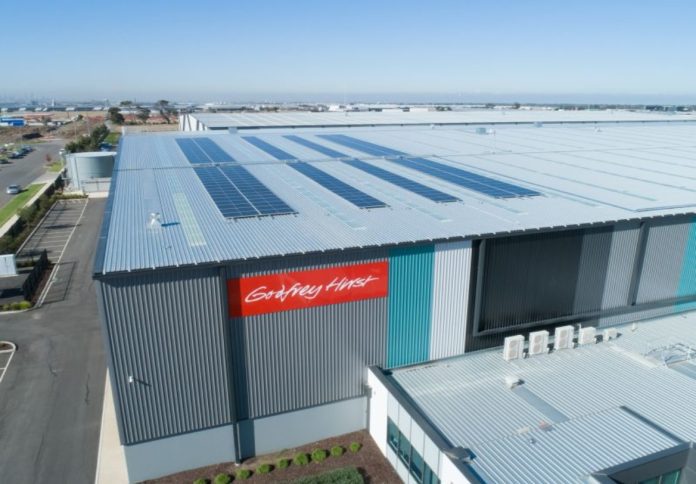
Australian flooring manufacturer Godfrey Hirst is celebrating 160 years of continuous local manufacturing, as it navigates rising energy prices, changing consumer trends, and global competition.
Based in Geelong, the company was established in 1865 and has evolved from producing flannels and blankets to becoming one of the country’s leading carpet and flooring manufacturers.
General Manager Jane Fletcher said the milestone reflects the company’s focus on long-term stability and commitment to maintaining a strong manufacturing presence in Australia.
“We’re focused on long-term stability and building a resilient foundation for growth,” Fletcher said. “I feel responsible for our future in that regard, as do most people here. We’re all pretty passionate about Godfrey Hirst.”
Fletcher, who joined the company in the 1990s as a Christmas casual before moving into production and executive roles, said the business is contending with significant headwinds, particularly rising operating costs and declining domestic carpet demand.
“Demand for carpet is declining in Australia with costs increasing, making manufacturing quite challenging for us,” she said. “Our electricity and gas costs have almost doubled over the past couple of years.”
Fletcher said gas security remains a concern despite the company having installed solar systems across all its sites, which currently supply only around 30 per cent of total electricity needs.
Labour and compliance costs also impact the company’s competitiveness against imported products, particularly from Asia.
“We’re really up against China and Asia, given they can import product similar to ours for less than what we can make it for,” Fletcher said. “Our commercial division – mainly tiles – is in a particularly competitive space, given tiles are far easier to physically import than rolled carpet.”
Fletcher said Godfrey Hirst maintains strict safety and ethical standards across its operations and supply chain, including initiatives targeting modern slavery and worker welfare.
“While this is unquestionably the right approach, it does create challenges when competing with regions where such standards are not enforced equally,” she said. “Added to the extra cost of wages, energy, environmental compliance and taxes, the cost of doing business in Australia is just horrendous.”
She said investing in new technology and replacing ageing gas-dependent equipment is essential for maintaining long-term manufacturing capability in Australia.
“To keep our type of manufacturing competitive in Australia for the next 20 to 50 years, a manufacturing sovereign capability fund needs to be set up by the Federal Government,” Fletcher said. “The only way to overcome our increased costs is to improve efficiency and productivity through modern, efficient equipment.”
Godfrey Hirst has been a member of the Australian Industry Group (Ai Group) since 2000. Fletcher said the company has benefited from access to legal guidance, training, and industry support provided through the group.
“Australian Industry Group membership is hugely beneficial,” she said. “The legal advisors are helpful and responsive; when we ask for help, we get it straight away.”
An Ai Group spokesperson said Godfrey Hirst represents the kind of legacy manufacturing Australia needs to preserve, especially amid increasing global supply chain uncertainty.
Fletcher said workforce stability has also helped the company stay competitive. Many of its employees have remained with the company for decades, supported by internal promotion and upskilling programs.
“A great example is how we train shop floor employees to become tufting mechanics, responsible for maintaining our large-scale carpet-making machines,” she said. “They undertake a four-year TAFE course here in Geelong while working full time.”
The company is marking its 160th anniversary with an event at Geelong’s National Wool Museum later this year. The museum will also host an exhibition recognising Godfrey Hirst’s historical contribution to the region and the broader manufacturing sector.
Founded by English weaver Godfrey Hirst, the company began as a woollen mill in the 19th century and transitioned into carpet production in the 1960s. It was acquired in 2018 by US-based Mohawk Industries, the world’s largest flooring company.
Fletcher said while the company continues to adapt to market and operational pressures, she remains optimistic about the future of local manufacturing.
“With further inroads into sustainability to help navigate the challenges we face, we’re expecting to be here for another 160 years,” she said.

















